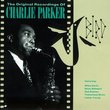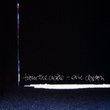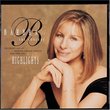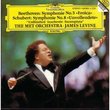| All Artists: Felix [1] Mendelssohn, Daniel Barenboim Title: Mendelssohn: Songs Without Words Members Wishing: 0 Total Copies: 0 Label: Deutsche Grammophon Release Date: 4/15/1997 Genres: Special Interest, Classical Style: Holiday & Wedding Number of Discs: 2 SwapaCD Credits: 2 UPC: 028945306124 |
Search - Felix [1] Mendelssohn, Daniel Barenboim :: Mendelssohn: Songs Without Words
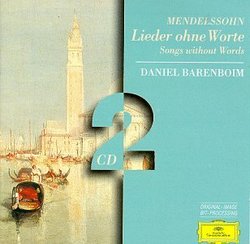 | Felix [1] Mendelssohn, Daniel Barenboim Mendelssohn: Songs Without Words Genres: Special Interest, Classical
|
Larger Image |
CD DetailsSimilarly Requested CDs
|
CD ReviewsGreat recording - true Barenboim Jesper Hansen | Ringkobing Denmark | 03/15/2000 (4 out of 5 stars) "Daniel Barenboim has always been one of my favourite pianists. I know him mostly as a Beethoven interpreter, but his recording of "Songs without Words" is up there with the best I've heard. The sound quality is as good as you have come to expect from DG and the performance is crystal clear and precise at all times. I aquired this recording beacuse I was keen to play some of the pieces myself but Barenboim has a few ideas of his own that I don't quite agree with. Most of the songs are played just as I imagine Mendelssohn wrote them, but some of them fall out and leaves a "not absolutely perfect after all" feeling inside you. However, if you are a fan of Barenboim you will love this recording. These wonderful songs deserve a unique performer like Barenboim. If you'd like to listen to Barenboim at his best I suggest that you listen to his Beethoven recordings, and especially the sonatnas." MENDELSSOHN'S 48 DAVID BRYSON | Glossop Derbyshire England | 09/01/2006 (5 out of 5 stars) "Bach's 48 preludes and fugues seem to me to be to some extent a diary of the composer's feelings, and I get much the same impression from Mendelssohn's Songs Without Words, which are also 48 in number. To me, they are beautiful and touching minor masterpieces and when I hear them I am not disturbed, or even visited, by the thought that they are not masterpieces to rank with Bach's. However I am not as exacting in evaluating a performance of them as I would be with Bach either, and when I willingly award this set 5 stars I know that I'm setting the bar lower. There are limits to what any interpreter, even the greatest, of the Songs Without Words can find in them, but for all that some interpreters are greater than others, and I happen to know even better accounts of some of these pieces than you will find on these two discs from Barenboim. It was high time in any case that I had a complete set of these lovely works. My collection up to now had only stretched to 14 of them, but - I have to say it again - those 14 are enough to teach me the difference between fine performances and great ones. Barenboim's accounts should be easily good enough for most of us most of the time, and in addition to the Songs he throws in the Children's Pieces plus a few other short numbers that Mendelssohn, for reasons known principally to himself, chose not to publish. With one solitary exception, Barenboim's touch is affectionate, warm and beautiful, and is well served by the 1974 recording. Speeds adopted sound about right to me in general, and the interpretations offered are full of insight and loving care, and free from eccentricity or egotism. Barenboim can be powerful when he needs to be, but the requirement for power is very limited in what we have here, and the overall impression that the set leaves is rightly one of tact, sympathy and enthusiasm. My single regret concerns my own favourite of all the Songs - the Duetto op 38/6. Something goes quite unaccountably wrong here. I'd call the speed too fast in the first place, and I would have liked the pseudo-voices brought out more strongly against the arpeggio accompaniment, but the real affront to my sensibilities comes when the two voices sing forte in octaves, and Barenboim bangs out the melody in a bad-tempered and cacophonous way that reminds me of one of Kissin's off-days. One botched effort out of 58 is not a bad ratio nevertheless. I can play the Duetto to my own satisfaction anyway, or I can listen to it on my old Turnabout LP played by Guiomar Novaes. Novaes seems to be all but forgotten these days, but she was a great player, recognised as such by no less than Debussy when she was a teenager. Her idea of the Duetto is slower than mine, indeed for an amateur like me the piece, which lies beautifully and naturally under the hands, seems practically to dictate its own speed. However it's not the tempo that makes the impression. In this piece as in many others starting with the very first of all the Songs, what transfixes me is the haughty and highlighted clarity of Novaes's melodic line and the magnificence of her left-hand tone. It also happens that in the disc that accompanies the biography of Serkin by Stephen Lehmann and Marion Faber there are two of the Songs in Novaes's selection - a solemn and gripping op 62/1 and a coruscating Spinning Song worthy of Horowitz or Cziffra for virtuosity. The point is simply this - there is an aura of greatness that surrounds the playing of Serkin and Novaes in practically anything they do. Admirable as he is, Barenboim is not quite in that league, although I don't consider the balance of advantage to be totally one-sided, and it may be that Barenboim actually makes a more appealing job of the Spring Song. Nevertheless I have only 14 of the Songs from Novaes, and all of two from Serkin, in somewhat antiquated sound at that. Barenboim gives me all 48 plus some bonus extras, played with love and appreciation of the soul of this beautiful and affecting music. This is a set I am going to be returning to for solace and balm to the spirit, I can tell already. The recorded sound is not wondrous, but it's good 1974 quality. The liner note is from the distinguished pen of Joan Chissell, but I can't say it seems to me to amount to much. Moreover she nails her colours to the mast with the ringing challenge `No 19th-century composer exceeded Mendelssohn in respect for Classical tradition, and such ordered modes of expression as fugue...' I dispute this strenuously. Not only are Mendelssohn's fugues not his best or most professional work, as Tovey makes very clear, they are inferior in respect for classical precedent and thoroughness of workmanship to Schumann's, as the same sage also points out. Besides which Brahms was a musical scholar of minute and profound learning, particularly steeped in the great German musical tradition, to an extent that Mendelssohn never rivalled. What Mendelssohn can claim is to be sui generis, what he does best he does better than anyone, and some of his most intimate musical thoughts are to be found in the Songs Without Words. For the pleasure and comfort they bring me I thank Mendelssohn's shade and the loving and expert guidance of Barenboim." FORGOTTEN (BY ME) BEAUTIES GEORGE RANNIE | DENVER, COLORADO United States | 05/14/2007 (5 out of 5 stars) "Until I purchased this bargain (two discs for the price of one), recording of Mendelssohn's "Songs without Words" that are played exquisitely by Daniel Barenboim, I, in the past, have listened mainly to Mendelssohn's chamber music, Concertos and/or Symphonies kind of forgetting about these most beautiful compositions, What a real pleasure this recording has been for me. I believe that Mendelssohn composed these" Songs without Words" (also included are Mendelssohn's "Kinderstucke", op 72, "Albumblatt", op. 117 and 2 short pieces) through out his short life. Daniel indeed plays all of the works including the "demanding" ones (there are surprisingly for me some very demanding ones) most beautifully never forgetting that the compositions are above all else "Songs". Daniel Barenboim always lets the melodies be heard above all else and there are some very beautiful melodies to hear.
This recording was made in the early 1970s; however, DGG has done a wonderful job of transferring them to the CD format--the sound is rich, lush and clear. If you want to hear some beautiful compositions that are played most beautifully, buy this recording. " |

 Track Listings (24) - Disc #1
Track Listings (24) - Disc #1
